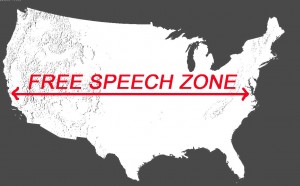May
22
The Digital Past
May 22, 2013 | Uncategorized | Leave a Comment
Our discussion in Tuesday’s class about paywalls included several valid points about why they were frustrating but sometimes necessary to support the sites providing public with information — but not necessarily those providing the information for the sites. What I’d like to learn more about are the legal aspects of copyrighting information versus copyrighting ideas. I think for the most part we all agreed that the boundaries for what can/can not and should/should not be protected are blurry and can be argued from multiple sides. That led us into debating the ridiculous hoops some universities are making students jump through to graduate. I think it’s unfortunate that the Study Elsewhere program is on the rocks because it was one of the few remaining breaks students get from the institution’s constant power trip. Our discussion of college’s requirements ties in with our discussion about copyrighting and the debate of should and shouldn’t be protected. By eliminating the Study Elsewhere option, the university is almost copyrighting current student’s degrees.
I’m considering the World War II Memorial for my final project. The aspects of the Memorial I would like to look into are the differences and similarities it has with other memorials commemorating WWII like the Holocaust museum. I want to investigate how certain aspects are portrayed in the different venues and how U.S. soldiers are painted.
Sep
12
September 12, 2012 | Uncategorized | Leave a Comment
According to Daily News, news regarding Supreme Court sub judice cannot be tampered with – or rather, completely ignored — in specific cases.
“No guidelines can be framed across the board to regulate media reporting of sub-judice matters,” said Chief Justice of New Dehli, S.H. Kapadia, “Finding an acceptable constitutional balance between free press and administration of justice is a difficult task in every legal system.”
Unlike the U.S. Constitution’s First Amendment, freedom of speech is not protected for the people of New Delhi. Any type of free speech in New Dehli that may infringe on others’ public rights is subject to be questioned, investigated, and qualified as lawful or unlawful under the courts’ scrutiny.
“Right to freedom of expression under the First Amendment in the US is absolute which is not so under the Indian constitution in view of such right getting restricted by the test of reasonableness and in view of the heads of restrictions under Article 19(2),” said a New Delhi Judge.
Though the courts of New Delhi seem to be aware of the limitations of social/judicial media, they are not adverse to the potential of fill political and religious freedom of speech.
Sep
10
Hello world!
September 10, 2012 | Uncategorized | 1 Comment
Welcome to onMason. This is your first post. Edit or delete it, then start blogging!
